
Archeomatica-Tecnologie per i Beni Culturali
Scope & Guideline
Fostering Collaboration for Cultural Heritage Innovation.
Introduction
Aims and Scopes
- Digital Preservation and Accessibility:
Research in this area emphasizes the use of digital technologies to preserve cultural heritage, enhance accessibility, and create digital representations of artifacts and sites, ensuring their availability for future generations. - Integration of Emerging Technologies:
The journal explores the integration of cutting-edge technologies such as AI, virtual reality, and blockchain into cultural heritage practices, enhancing both the engagement and educational aspects of cultural tourism and heritage. - Interdisciplinary Approaches:
The scope includes interdisciplinary methodologies that combine archaeology, history, and technology, fostering collaboration between universities, museums, and the cultural sector to create innovative solutions for heritage management. - Cultural Education and Outreach:
A significant focus is placed on educational initiatives that utilize digital narratives and immersive experiences to disseminate knowledge about cultural heritage, making it more accessible to diverse audiences. - Sustainability in Cultural Heritage:
Research also addresses the sustainability of cultural heritage practices, emphasizing environmentally friendly technologies and methods that ensure the long-term preservation of heritage sites.
Trending and Emerging
- Digital Transformation in Cultural Heritage:
Recent publications highlight the increasing integration of digital technologies in the management and presentation of cultural heritage, showcasing projects that digitize collections and enhance public access. - Artificial Intelligence in Cultural Heritage:
There is a growing focus on the application of AI technologies in cultural heritage, including AI-based learning for tourism and the use of AI in art creation, which reflects the potential of these technologies to redefine cultural engagement. - Immersive and Interactive Experiences:
The trend towards immersive experiences, such as virtual tours and augmented reality applications, is gaining momentum, emphasizing the importance of engaging audiences in innovative ways to foster a deeper connection with cultural heritage. - Sustainability and Resilience in Heritage Practices:
Emerging themes include sustainability practices in cultural heritage management, focusing on energy-efficient technologies and practices that ensure the resilience of cultural sites against environmental challenges. - Blockchain and NFTs in Cultural Heritage:
The exploration of blockchain technology and non-fungible tokens (NFTs) for the valorization and exchange of cultural assets is an emerging area of interest, indicating a shift towards new models of ownership and engagement in the digital age.
Declining or Waning
- Traditional Archaeological Methods:
There is a waning emphasis on traditional archaeological methods that do not incorporate modern technology, as the field increasingly favors innovative, tech-driven approaches to excavation and analysis. - Physical Artifacts over Digital Representations:
The focus appears to be shifting from the physical study of artifacts to their digital representations, as more research is directed towards creating virtual models and immersive experiences rather than solely examining physical items. - Static Exhibitions:
There is a decreasing interest in static exhibitions that do not utilize interactive or digital components. The trend is moving towards dynamic, technology-enhanced displays that engage audiences in new ways. - Conventional Conservation Techniques:
As technology advances, conventional conservation techniques that do not integrate modern tools and methodologies are becoming less prominent in the journal's publications, indicating a shift towards more innovative practices.
Similar Journals
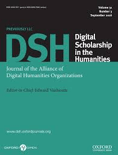
Digital Scholarship in the Humanities
Advancing the Future of Humanities through Digital Innovation.Digital Scholarship in the Humanities is a premier journal published by Oxford University Press, dedicated to advancing research at the intersection of digital technology and the humanities. With an ISSN of 2055-7671 and an E-ISSN of 2055-768X, this journal serves as a vital platform for scholars exploring the vast potentials of digital methodologies in humanities disciplines, particularly in linguistics and language studies. Recognized within the Q1 quartile for linguistics and language categories, it stands out with notable Scopus rankings, including top positions within the 80th percentile for Arts and Humanities. The journal emphasizes open access to promote broader dissemination of knowledge, making it accessible to a diverse audience of researchers, students, and professionals. Spanning from 2015 to 2024, Digital Scholarship in the Humanities aims to foster interdisciplinary collaboration and innovation, reflecting the growing importance of digital tools in redefining scholarship.
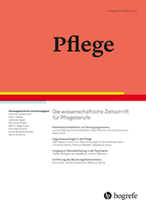
Pflege
Transforming challenges into advancements in nursing.Pflege, published by HOGREFE AG-HOGREFE AG SUISSE, is a prominent scholarly journal dedicated to the field of nursing and medicine. Since its inception in 1991, the journal has served as a key platform for disseminating research findings, reviews, and advancements in nursing practices, addressing the myriad challenges and innovations shaping healthcare today. With an ISSN of 1012-5302 and an E-ISSN of 1664-283X, Pflege is indexed in Scopus, where it ranks #87 out of 139 in General Nursing, reflecting its moderate impact within the academic community, with a Q3 classification in both medicine and nursing fields for 2023. Through rigorous peer reviews and a commitment to quality scholarship, the journal aims to foster interdisciplinary dialogue, enhancing both educational and clinical practices among healthcare professionals. Although it is not an open-access publication, Pflege continues to be an essential resource for researchers and practitioners seeking to advance their knowledge in the dynamic field of nursing and enhance patient care.

Archeologia e Calcolatori
Unlocking New Frontiers in Archaeological KnowledgeArcheologia e Calcolatori is a distinguished open-access journal published by EDIZIONI ALL INSEGNA GIGLIO SAS in collaboration with the Italian National Research Council, dedicated to advancing knowledge in the fields of archaeology and its intersections with computational methodologies. Since its inception in 1998, the journal has become a pivotal resource for researchers and practitioners, offering a platform for innovative studies and critical discussions at the forefront of archaeological science. With its current impact reflected in Scopus rankings, Archeologia e Calcolatori is placed in Q2 for both Archaeology and Archaeology (Arts and Humanities), and its commitment to quality scholarship is evident. The journal benefits from open access, ensuring that scholarly findings are readily available to a global audience. By prioritizing the dissemination of interdisciplinary research methods and explorative analyses, it aims to foster collaboration and inspire new directions in archaeological and computational research.

Egyptian Journal of Archaeological and Restoration Studies
Preserving Heritage, Shaping Scholarship.Welcome to the Egyptian Journal of Archaeological and Restoration Studies, a vital resource for scholars and practitioners in the field of archaeology and restoration. Published by the renowned SOHAG UNIV PUBLICATION CENTER-SUPC, this journal aims to disseminate cutting-edge research that illuminates the rich archaeological heritage of Egypt and beyond. With ISSN 2090-4932 and E-ISSN 2090-4940, this journal showcases innovative methodologies and interdisciplinary approaches, significantly contributing to our understanding of cultural heritage preservation. The journal's growing influence is reflected in its Q3 ranking in multiple categories, including Archaeology, Conservation, and Cultural Studies as of 2023, alongside its noteworthy placement within the Social Sciences. Open access options provide wider accessibility to essential studies, making it an indispensable tool for researchers, professionals, and students alike. Join us in exploring the past and shaping the future of archaeological scholarship.
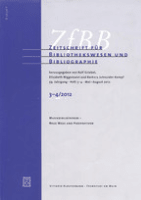
ZEITSCHRIFT FUR BIBLIOTHEKSWESEN UND BIBLIOGRAPHIE
Exploring Innovations in Library and Information PracticesZEITSCHRIFT FUR BIBLIOTHEKSWESEN UND BIBLIOGRAPHIE is a distinguished academic journal dedicated to the fields of library science and bibliography, published by Vittorio Klostermann GmbH in Germany. With a historical foundation dating back to 1969 and a focus on contemporary research and practices in library and information sciences, this journal serves as a vital resource for scholars, practitioners, and students alike. Although it currently operates under a traditional subscription model, it remains an important platform for the dissemination of scholarly work, boasting insights into critical developments within the field. The journal's Scopus rank places it in the challenging Q4 category, reflecting its commitment to advancing knowledge in a competitive landscape. Published regularly, the journal invites contributions that discuss theoretical innovations, practical approaches, and empirical research, fostering collaboration and knowledge exchange among professionals in library management, information retrieval, and archival studies. By continuing to explore relevant topics, ZEITSCHRIFT FUR BIBLIOTHEKSWESEN UND BIBLIOGRAPHIE remains pivotal in shaping the future discourse in library and information sciences.
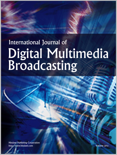
International Journal of Digital Multimedia Broadcasting
Bridging Disciplines in Digital BroadcastingThe International Journal of Digital Multimedia Broadcasting is a leading scholarly platform dedicated to the interdisciplinary exploration of digital multimedia broadcasting, published by HINDAWI LTD. With an ISSN of 1687-7578 and an E-ISSN of 1687-7586, this Open Access journal has made significant strides since its inception in 2008, ensuring wide accessibility and dissemination of research. Based in the United States, at Adam House, 3rd Flr, 1 Fitzroy Sq, London W1T 5HF, England, the journal covers a range of topics relevant to Communication, Electrical and Electronic Engineering, and Media Technology, boasting impressive Scopus rankings that highlight its influence in these fields. As part of the Q3 category in Communication and Electrical Engineering, and Q2 in Media Technology for 2023, the journal serves a vital role in fostering the understanding of technological advancements and their applications in multimedia broadcasting. Researchers, professionals, and students are encouraged to contribute to and benefit from the journal's rich repository of knowledge, paving the way for innovative developments in this dynamic industry.

In Situ-Revue de Patrimoines
Exploring interdisciplinary insights into our shared legacy.In Situ-Revue de Patrimoines is a distinguished open-access journal published by the MINISTERE CULTURE & COMMUNICATION, dedicated to advancing the field of heritage studies. Established in 2001, this journal seeks to foster a deeper understanding of cultural heritage through the dissemination of high-quality research articles, reviews, and case studies that reflect the interdisciplinary nature of the discipline. With an ISSN of 1630-7305, In Situ provides scholars, practitioners, and students with invaluable insights into the preservation, management, and interpretation of cultural assets. By offering open access to its content, the journal ensures that vital knowledge in heritage conservation reaches a broad audience, promoting dialogue and collaboration within the global academic community. Situated in the heart of Paris, In Situ serves as an essential resource for those committed to the stewardship of our shared cultural legacy.
Muzeologia a Kulturne Dedicstvo-Museology and Cultural Heritage
Innovating practices in preserving our cultural legacy.Muzeologia a Kulturne Dedicstvo-Museology and Cultural Heritage is a premier scholarly journal published by COMENIUS UNIVERSITY BRATISLAVA, focusing on the vital intersections of museology, cultural heritage, and conservation practices. Since its inception in 2013, this open-access journal has established itself as a leading platform for high-quality research, boasting impressive rankings in the 2023 Scopus metrics—#15 out of 83 in Museology and #28 out of 103 in Conservation. With a commitment to fostering an inclusive academic community, the journal welcomes innovative studies and critical discussions that address contemporary challenges in preserving cultural assets. Operating under an open-access model since 2017, Muzeologia a Kulturne Dedicstvo ensures wide dissemination of research findings, thereby enhancing visibility and accessibility for scholars, professionals, and students worldwide. As it continues to converge from 2013 to 2024, this journal not only serves as a vital resource but also as a catalyst for advances in the understanding and practice of museology and cultural heritage preservation.
RESTAURATOR-INTERNATIONAL JOURNAL FOR THE PRESERVATION OF LIBRARY AND ARCHIVAL MATERIAL
Preserving the Past, Shaping the Future.RESTAURATOR-INTERNATIONAL JOURNAL FOR THE PRESERVATION OF LIBRARY AND ARCHIVAL MATERIAL, published by WALTER DE GRUYTER GMBH in Germany, is an esteemed scholarly journal dedicated to the conservation and preservation of library and archival materials. With a history spanning from its first publication in 1970, this journal has become a vital resource for professionals, researchers, and students in the fields of conservation, materials science, and media technology. The journal holds a Q2 classification in Conservation and positions itself within the top 30% of its peer category, reflecting its commitment to quality research and innovative practices. Although the journal is not open access, it offers invaluable insights into preservation methodologies, case studies, and advances in materials technology, supporting the ongoing dialogue within the conservation community. Its indexed presence in Scopus, especially notable in the Arts and Humanities and Engineering categories, further underscores its relevance and impact in shaping contemporary practices in conservation.

Cabas
Advancing educational interpretation for a brighter tomorrow.Cabas is a distinguished academic journal dedicated to advancing the field of educational interpretation and studies, published by the CENTRO RECURSOS INTERPRETACION ESTUDIOS ESCUELA (CRIEME). With its ISSN 1989-5909 and E-ISSN 1989-5909, it has positioned itself as a vital resource for researchers and practitioners interested in innovative educational methodologies and interpretations since its establishment as an Open Access journal in 2009. Based in Polanco, Cantabria, SPAIN, this journal seeks to disseminate high-quality research that fosters academic exchange and collaboration in the educational sector. Although specific metrics such as HIndex and Scopus ranks are currently unavailable, the journal's commitment to accessibility and knowledge sharing is paramount, allowing a broader audience of educators, researchers, and students to engage with significant findings and discussions in the field.